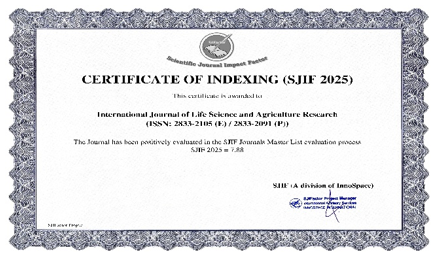Contribution of Civil Society in Climate Change Adaptation in Nairobi City County, Kenya
DOI:
https://doi.org/10.55677/ijlsar/V02I10Y2023-08Abstract
The impacts of climate change, the brunt of which is experienced in the Global South, have occasioned the development of adaptation plans, policies, and strategies by developing countries, with the aim of reducing vulnerability and risks. By and large, however, these adaptation plans and strategies have not yielded the expected results, as evidenced by the increasing manifestations of climate change, including declining agricultural production, food insecurities, and floods, among others. Against this backdrop, this study sought to explore the avenues for enhancing the contribution of civil society organizations in adapting to climate change in Nairobi City County, Kenya. The study adopted the descriptive survey design, targeting all 267 civil society organizations pertinent to adapting to climate change in Kenya. A total of 160 top administrative personnel were randomly sampled from among the civil society organizations. Primary data was gathered for the study using a standardized questionnaire. In data analysis, descriptive analysis and a Chi-square test were performed. The results established that mobilization, knowledge sharing, and policy support have a significant effect on the contribution of CSOs in adapting to climate change in Nairobi City County. It was also found that institutional coordination was also found to have a significant intervening role in the association between the avenues for enhancing the contribution of CSOs in adapting to climate change in Nairobi City County, Kenya. It is thus recommended that administrators of CSOs involved in adapting to climate change in Nairobi City County, invest in mobilization, knowledge sharing, policy support, and institutional coordination.
References
Banks, N., Hulme, D. & Edwards, M. (2019). NGOs, States, and Donors Revisited: Still Too Close for Comfort? World Development, 66: 707–18
Brouwer, S., Rayner, T., & Huitema, D. (2020). Mainstreaming climate policy: The case of climate adaptation and the implementation of EU water policy. Environment and Planning C: Government and Policy, 31(1): 134–153
Cook, N.J., Wright, G.D. & Andersson, K.P. (2017). Local Politics of Forest Governance: Why NGO Support Can Reduce Local Government Responsiveness, World Development, 92: 203–14.
Daron, J., Lorenz, S., Taylor, A. et al. (2021). Communicating future climate projections of precipitation change. Climatic Change 166, 23
Dombrowski, K. (2018), ‘Filling the Gap? An Analysis of Non-governmental Organizations Responses to Participation and Representation Deficits in Global Climate Governance’, International Environmental Agreements, 10: 397–416
Filho, W. L. (2017). Climate Change Adaptation in Africa. (Walter Leal Filho, B. Simane, J. Kalangu, Menas Wuta, P. Munishi, Musiyiwa, & Kumbirai, Eds.) (Climate Ch). Hamburg, Germany: Springer Nature. https://doi.org/10.4324/9781315794907
Gouldson, A. (2019). Advances in Environmental Policy and Governance, Environmental Policy Governance, 19: 1–2.
Haris, S.M., Mustafa, F.B. & Raja Ariffin, R.N. (2020). Systematic Literature Review of Climate Change Governance Activities of Environmental Nongovernmental Organizations in Southeast Asia, Environmental Management, 66: 816–25.
KCCWG (2022). About KCCWG. Available at https://www.kccwg.org/about. Accessed on 16th May 2022
Kibe, W. G. (2018). Effectiveness of Kenya’s Climate Change Mitigation Strategies After the Ratification of United Nations Framework Convention on Climate Change (UNFCCC) Protocols. Unpublished Masters Thesis, United States International University-Africa
Kuyper, J.W., Linnér, B.O. & Schroeder, H. (2018). Non-state Actors in Hybrid Global Climate Governance: Justice, Legitimacy, and Effectiveness in a Post-Paris Era, Wires Climate Change, 9(1): e497.
Lane, M.B. & Morrison, T.H. (2019). Public Interest or Private Agenda? A Meditation on the Role of NGOs in Environmental Policy and Management in Australia, Journal of Rural Studies, 22(2): 232–42.
Lwasa, S. (2018). Adapting urban areas in Africa to climate change: The case of Kampala. Current Opinion in Environmental Sustainability, 2(3), 166–171
M’mboroki, K. G. (2018). Climate Change Impacts and Adaptive Mechanisms of Pastoral Communities in Mukogodo Forested Areas of Laikipia County in Kenya. Unpublished Doctoral Thesis, University of Nairobi
Nderitu, M. W. (2018). Enhancing Climate Change Adaptation Through Utilisation of Social and Environmental Opportunities for Agropastoral Communities of Kieni in Nyeri County. Unpublished Doctoral Thesis, University of Nairobi
NECSA-K, (2022). About Us. Available at http://necsakenya.org/page/about-us. Accessed on 16th May 2022
Newell, P., Pattberg, P. & Schroeder, H. (2012). Multiactor Governance and the Environment, Annual Review of Environment and Resources, 37: 365–87
O’Brien, K., Leichenko, R., & Vogel, C. (2018). Disaster Risk Reduction, Climate Change Adaptation, and Human Security Norwegian Ministry of Foreign Affairs Disaster Risk Reduction, Climate Change Adaptation and Human Security. Security, 3, 78.
Odei, E. M., M. Abunyewah, J. E. & Buernor, E. A. (2020). Citizen participation dilemmas in water governance: An empirical case of Kumasi, Ghana. World Development Perspectives, 20, 100242.
Ojwang, L., Rosendo, S., Celliers, L., Obura, D., Muiti, A., Kamula, J., & Mwangi, M. (2017). Assessment of Coastal Governance for Climate Change Adaptation in Kenya, Earth’s Future, 5(1): 1-21.












